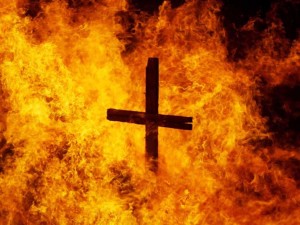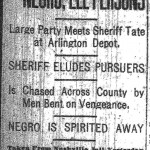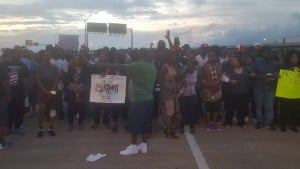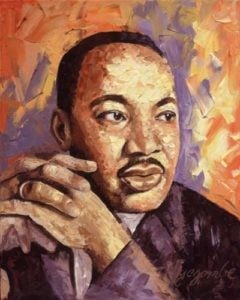 Below is a presentation I gave on February 16, 2017 at the Violence and Memory: Memorializing Historical Traumas from the Holocaust to the Jim Crow South symposium at the University of Memphis.
Below is a presentation I gave on February 16, 2017 at the Violence and Memory: Memorializing Historical Traumas from the Holocaust to the Jim Crow South symposium at the University of Memphis.
In the presentation, I offered a rhetorical history and trajectory of Bishop Henry McNeal Turner’s rhetoric in chronicling, describing and detailing racialized violence against African Americans. Starting in the early days of Reconstruction and lasting throughout his life, through his many editorials, letters, speeches, interviews and essays, Turner shared stories and eyewitness accounts of the brutality that many African Americans faced during the nineteenth century. His writings serve as a reminder of just how brutal the (post) reconstruction era was and in many ways, how we are still living that brutal legacy today.
The original title for the talk was “A Nation of Murderers”: Bishop Henry McNeal Turner and the Rhetoric of Racialized Violence.
In an editorial to the Christian Recorder newspaper on December 14, 1876, Henry McNeal Turner, in response to the killing of African Americans by white terrorists wrote, “The meanness of this nation towards the negro, will never be known until it is read in the glare of eternity.” He further lamented,
The best that can be said for this country is that it is a nation of murderers. The North has been killing Southern Negroes as virtually as the Ku-Klux and White Leagues have, and every white statesman, orator, minister of the Gospel, merchant, doctor, and private citizen in this whole nation, who has not fought these massacres (for holding your mouth is no excuse) and the injustice perpetrated on the blacks, the nation’s wards are guilty before God. And if they ever get to heaven at all, they will have to swim there through the blood of forty-six thousand Negroes, which it is reported in Washington have been killed since January 1866.
As the killing and racial violence towards African Americans from home grown racist terrorists went unabated, Turner called for other measurers. On March 17, 1897, the New York Times carried a headline that read, “Negroes Get Guns!” The headline was in reference to Turner’s commentary on the lynching in New Orleans of John Johnson and Archibald Jointry. The Times reported Turner calling for African Americans to get guns in an effort to protect themselves from the violence that many racists inflicted upon them.
Let every Negro in this country with a spark of manhood in him supply his house with one, two, or three guns or with a seven or a sixteen shooter and we advise him to keep them loaded and ready for immediate use and when his domicile is invaded by bloody lynchers or any mob by day or night, Sabbath or weekday, turn loose your missiles of death and blow your fiendish invaders into a thousand jibblets.
He closed by admonishing African Americans, “Get guns Negroes, Get guns and may God give you good aim when you shoot.”
Turner’s advocacy for self-defense was a response not only to the lynching happening to blacks throughout the country, but it was also a response to the treatment many faced throughout post-reconstruction. Turner found himself at odds many times with not only whites but also some blacks who during this time promoted a gradualist approach to the racial problems of the day. Turner eventually declared that there is no “manhood future for the negro” in America and steadfastly promoted emigration to Africa as the only way for African American survival.
However, eventually coming to the realization that emigration would not happen on the mass scale that Turner desired, he began to bear witness to the oppression and outright terror that many African Americans faced on a daily basis. Not to be safe anywhere one went, or not even to be safe in one’s own home, was a daily occurrence for many African Americans who attempted to participate in American life.
Turner’s pessimistic attitude had not always been a part of his rhetoric. Born “free” in New Berry Courthouse, South Carolina in 1834, Turner was an autodidact who always inspired to be more. Early in his life, he had a dream in which he saw himself speaking to thousands of people and helping members of his race. His rhetorical training started at the feet of his grandmother who taught him the art of storytelling and listening to the itinerant preachers who use to travel around preaching the word of God. As a child Turner use to mimic the preachers that he heard as his friends served as ecstatic congregants in his backyard church. When friends were not available, animals serve as Turner’s auditors.
Turner’s father died early in his childhood and when his mother remarried, the family moved to Abbeville, South Carolina. There Turner started to work for a group of attorneys who noticed his quick wit, sharp mind and his astounding memory. They took it upon themselves to further his educational pursuits by teaching him the classics, sciences, and even theology. He had always wanted a formal education but the state of South Carolina did not allow African Americans to attend school or for others to teach them how to read and/or write. On the help he received from the lawyers, Turner would later call this moment an answer to his prayers.
He would later accept his call to preach at the age of nineteen in the Methodist Episcopal Church. Three years later, he married Eliza Ann Peacher of Columbia, South Carolina. She would be instrumental in his early days of preaching as Turner serve as an itinerant preacher for the denomination. However, despite preaching to both black and white audiences and his success on the revival circuit, Turner quickly became disillusioned with the Methodist Church because, though licensed to preach, he could never be ordained or become a bishop. During a fortuitous trip to New Orleans, Turner met Willis H. Revels, who would introduce him to the African Methodist Episcopal Church (AME). Turner would later join the church and find himself assigned to a churches in Baltimore and Washington DC.
It was here that Turner’s public career took off. He not only served as pastor of Israel AME Church in Washington, DC, but he also served as a regular correspondent for the Christian Recorder newspaper. Several newspapers featured his sermons and he hosted many senators and members of Congress in his church. He had also became a supporter of the Union in the Civil War. Many of his sermons aimed at getting his members to support in some way the Union effort. Turner also led efforts to recruit members for the First Regiment United States Colored Troops. For his hard work and support of the cause, President Lincoln appointed him chaplain of the group making him the first African American named chaplain of any branch of the military.
After the war, Turner moved to Georgia. While building the AME church there, Turner also found time to become a State Constitutional delegate, and a State Representative. He would eventually become the Presiding Elder of Georgia for his church and eventually Bishop. Along with these accomplishments, Turner was the first African American postmaster general (Georgia), offered bills in the Georgia House of Representatives giving all women the right to vote and creating an eight hour work day, was the publication manager (1876-1880) of the African Methodist Episcopal Church (AME), ordained the first women as elder in the AME church—an ordination that the other Bishops later rescinded.
Moreover, while doing all of this, Turner found time to start three newspapers—Southern Recorder (1887-1889), Voice of Missions (1893-1900) and the Voice of the People (1901-1904) serving as editor of all three, take four trips to Africa himself, establish the AME church in Africa, write numerous articles and essays for various newspapers, write several introduction to books, preach and lectured all over the country and to carry out his Episcopal duties. In short, if he lived today, many would call Turner a public intellectual or public theologian—and yes, by the copious amount of material Turner wrote, he would definitely be a blogger and heavy on social media.
After the war and Union victory, Turner returned South and involved himself in the politics of Reconstruction. Like many African Americans, Turner believed that Reconstruction would lay the foundation for equality. On January 1, 1866, as the keynote speaker for Emancipation Day, Turner, at probably the height of his optimism, ended his speech with the charge to blacks in the audience:
Let us love the whites, and let by-gones be by-gones, neither taunt nor insult them for past grievances, respect them; honor them; work for them; but still let us be men. Let us show them we can be a people, respectable, virtuous, honest, and industrious, and soon their prejudice will melt away, and with God for our father, we will all be brothers.
As America began the Reconstruction project, Turner quickly found out how tough it would be for white prejudice to melt away. On one trip to Alabama, Turner, in a letter published June 23, 1866 in the Christian Recorder, shared the story of the beating of Rev. Robert Alexander—a minister who wanted to preach and start a school in the area. “Four white citizens broke into his room at midnight,” Turner wrote, “and beat and stabbed him until he appeared like a lump of curdled blood.” When the women ran screaming to the Agent of the Freedmen’s Bureau for help saying, “come and save our minister from being murdered,” the Agent only replied, “I can’t do anything for you” and “never got out of his bed.” Turner closed the letter with a lament: “O God! where is our civilization? Is this Christendom, or is it hell? Pray for us.”
Turner, while a member of the Georgia House of Representatives, had an opportunity to participate in a joint committee to investigate the Georgia Penitentiary System. During Turner’s investigation, he discovered that black women not only were on chain gangs, but also were “whipped on the butt in the presence of men” and made to relieve themselves in front of men. Then there was a story of a man only known as Aaron who prison guards whipped with a “double strap.”
They stripped him stark naked and tied him with the shackles around the crosstie and then stretched him out, with his belly down on the crossties. He fell off and was then whipped on the privates. As we were going home at night he stopped and said, “Good-bye boys, I am going to die.” DeVancy then said, “If you want to die, I’ll help you.” He then whipped him about ten minutes, when he fell dead. He was buried just about day the next morning
Even when prisoners became sick, they were subject to beatings. Turner learned of one such case when the doctor, instead of treating the man, killed him by bludgeoning him to death. There was no inquest held over the body and a fellow prisoner had to make a box for the dead prisoner.
Turner testified before Congress on November 3, 1871. When asked about the “lawless violence and outrages” perpetrated by the Klu-Klux Klan, Turner talked about how “night prowlers” threatened his own life. “I am satisfied that on two or three occasions,” Turner answered, “I may say in a dozen instances, if I had not secreted myself in houses at times, in the woods at other times, in a hollow log at another time, I would have been assassinated by a band of night-prowlers, or rovers, I will call them.”
Turner then shared about the time he was in Columbus, Georgia and how a Mr. Ashburn was with him on the stage as Turner delivered a speech. “About a half an hour after I came out, Turner told the committee, a band of organized Ku-Klux, or assassins, went to Mr. Ashburn’s house and murdered him.” He told them that he also learned from someone that if the killers knew where Turner was, they would have murdered him as well.”
When asked by a member of the committee had Turner known of any people “injured” by “night marauders,” Turner answered that he had seen “scores of them. I have seen men who had their backs lacerated. I have seen other men who had bullets in them; I have seen others who had their arms shot off, shot so badly that they had to be amputated; I have seen others with legs shot off. I have heard of any quantity of horrible deed.”
When asked about how many murders have been committed in the state since the spring of 1868 Turner responded
We held a Southern States convention week before last in Columbia, South Carolina, at which place there were delegates from all the Southern States. We meet together at the request of the committee on murders and outrages, and according to the best of our knowledge and belief it was estimated that since reconstruction between fifteen hundred and sixteen hundred had been perpetrated.
When his interlocutor asked “in the South” Turner answered, “No, in the State of Georgia.” When pressed on how many murders have happened in all the southern states since 1868, Turner responded that it had not been “less than twenty thousand.” That number, Turner noted, was what delegates had agreed upon based from the reporting that each delegate made to the “murder and outrages” committee.
In his many letters to the editor, Turner chronicled the extra-judicial and state sponsored violence perpetrated against African Americans. In one to the Colored Tribune published March 18, 1876, Turner wondered just how long African Americans could last in America. “I have just figured up the reported number of colored persons who have been brutally killed within the last twenty-five days in this State alone,” Turner wrote, “and find the sum to be twenty-seven.” Moreover, the twenty seven Turner wrote could have been “augmented to thirty-seven if all the facts were known through the State and “no white man has been or will be arrested if he kills forty Negroes.
In another letter to the editor of the Christian Recorder newspaper dated January 4, 1883, Turner wrote that it had been estimated that the murders and outrages perpetrated upon black people since 1867 was somewhere in the neighborhood of 200,000. Quoting an article in the New Orleans Christian Advocate, Turner, in a letter to the editor dated February 22, 1883, wrote that “there is not a night that some colored person is not lynched in the State of Louisiana…. There is not a night, or a day either, the year round that our people are not most brutally murdered.”
In another editorial in the Voice of Missions newspaper, Turner responding to his emigration critics wrote that “times are growing worse, the Negro is becoming more degraded, our treatment more brutal, laws more inhuman are being enacted, and not a single remedy is proposed, not a plan suggested, not an idea advanced for the betterment of our condition.”
After the Supreme Court determined that separate could indeed be equal in the Plessy v Ferguson case, Turner lamented the decision. He wrote, “I have absolutely no interest in the issues of the bloody, lynching nation, with its brutal Supreme Court in Washington City issuing decisions against my race which were never dreamed of in hell.” He implicated both political parties—Democrat and Republican and wrote, “Neither of them care anything about the Negro” because in Turner’s estimation, neither party in Congress “ever open their mouths about the way my race is butchered, shot and burnt without law or civil rule.” He continued his denunciation when he wrote, “This rotten country has no business being a nation anyway.” He called the nation an “an organized mob” and for those who did not participate directly in “lawless murders, Jim Crow car discriminations and every other devilment against my race, (they) stand by and say ‘well done’ by their silence.
As the nation moved into the twentieth century, Turner’s criticisms and attacks grew even stronger. In writing a response to his African emigration proposal to the Indianapolis Freedman newspaper, Turner lamented:
Last year four hundred sixty six colored men were killed, according to the published accounts of over a hundred newspapers…….Talk about dying in Africa, my God, can we die any faster than we are being murdered here?
When he wrote a response essay in 1902 for D W Culp’s Twentieth Century Negro Literature: Or a Cyclopedia of Thought on the Vital Topics Relating to the American Negro, Turner’s pessimism was in full bloom. Culp asked Turner and three others to address the question, “Will it Be Possible for the Negro to Attain, in this Country, Unto the American Type of Civilization?” While the other invited authors took a more conservative to moderate tones, Turner questioned the merits of the question.
While acknowledging that the United States had “almost every form of government, necessary to regulate the affairs of a civilized country,” he lamented that “we are often confronted through the public press with reports of the most barbarous and cruel outrages, that can be perpetrated upon human beings, known in the history of the world. Further Turner wrote that “no savage nation can exceed the atrocities which are often heralded through the country and accepted by many as an incidental consequence. Men, he continued, “are hung, shot and burnt by bands of murderers who are almost invariably represented as the most influential and respectable citizens in the community
For Turner, “judges surrounded with court officers are powerless before these bloody mobs” and sheriffs are as “helpless as newborn babes.” According to Turner:
[C]ivilization presurmises legal adjudication and the intervention of that judicial authority which civilized legislation produces. And when properly administered the accused is innocent till he gets a fair trial; no verdict of guilt from a drunken lawless mob should be accepted by a civilized country; and when they do accept it they become a barbarous people. And a barbarous people make a barbarous nation. Civilization knows no marauders, mobs or lynchers and anyone adjudged guilty by a drunken band of freebooters is not guilty in the eyes of a civilized people. For the ruthless and violent perpetrators of lawless deeds, especially when they are incarnate, are murderers to all intents and purposes, and popular approval does not diminish the magnitude of the crime. Millions may say, “Well done,” but God, reason and civilization stamp them as culprits.
While admitting that many would not and have not participated in these “violent and gory outrages” on people of African descent, he reminded his audience that physically not participating “is no virtue that calls for admiration.” For Turner, silence was betrayal.
As long as they keep silent and fail to lift up their voices in protestation and declaim against it, their very silence is a world-wide acquiescence. It is practically saying, well done. There are millions of people in the country who could not stand to kill a brute…..But they are guilty of everything the drunken mobs do, as long as they hold their silence.
Then Turner turned back to the question of the essay. “Such being the barbarous condition of the United States, my decision is that there is nothing in the United States for the Negro to learn or try to attain to.”
Turner’s pessimism continued throughout the remainder of his life. Believing as he did that African emigration was the answer to the brutality faced by African Americans—while at the same time understanding that a good majority of African Americans did not favor emigration, Turner continued to bear witness to the atrocities that black people faced on a daily basis. He along with Ida B. Wells, Frances Ellen Watkins Harper and a host of others continued to proclaim the truth about racialized violence to any who would hear it.
And even in their day, they were not popular. Many called them crazy; many called them alarmists. They were charged with inciting racial hatred and many within their own communities wished they would just not say or write anything about the violence perpetrated against African Americans. Turner himself was called a blowhard, a crank, scatter brain, a brute and a kook. His continued chronicling of black death coupled with his stinging critiques and indictments on both white people and the “scullion” class of Negro leadership, frustrated many. While many wanted to look the other way, Turner keep the focus on the vile and wicked deaths of black people across America. Turner warned that if nothing was done about the extrajudicial killing and racialized violence from white terrorists on black bodies, people would just become accustom to it—people would believe that since it is ubiquitous, it is just the natural order of things.
Turner died in May 8, 1915 while on official church business. About eighteen months earlier on October 13, 1913, Turner gave a speech to a packed house at Institutional AME Church in Chicago. In that speech, he closed with a warning to his audience, “There are going to be lots of hard times coming, mark my words—times we have not passed through yet….It will come before you leave the earth, but while I am sleeping in my grave my words will still be ringing in your ears.” And as we continue to speak up and speak out about the racialized violence happening in our times—as we continue to chart the treacherous waters that we will have to face—as we discern and decide our roles of resistance; as we continue to stand firm in our traditions of hope, we echo Turner’s words—“there are some hard times coming—times we have not passed through yet. And as we say in the Black Church, Turner ain’t never lied!”
Thank You!
Andre E. Johnson is the Founder and Editor of the R 3 blog and Director of the Henry McNeal Turner Project.
Donate to the Work of R3
Like the work we do at Rhetoric Race and Religion? Please consider helping us continue to do this work. All donations are tax-deductible through Gifts of Life Ministries/G’Life Outreach, a 501(c)(3) tax exempt organization, and our fiscal sponsor. Any donation helps. Just click here to support our work.












